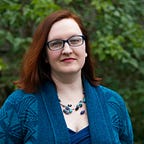A Phenomenal Physiologist
The wild and wonderful life of Ida Henrietta Hyde
At the age of 14, Ida Henrietta Hyde found herself in the precarious position of family breadwinner. Her parents were immigrants to America from Germany, and they’d lost everything, including their business, when their house burned down in the Great Chicago Fire of 1871.
Slowly, Ida worked her way up from milliner’s apprentice to shop salesperson. One day at work, she stumbled upon an English copy of Alexander von Humboldt’s natural history masterpiece Views of Nature. Humboldt’s poetic, emotional essays overflowed with detailed descriptions of the natural world. His prose put the reader at the center of the action, in landscapes and lands most Western people had only dreamed of visiting. The book essentially invented a new genre of nature writing, a new way to think about nature and for humans to think about their relationship and interconnection to it. It was science writing that wasn’t stodgy and dry, but downright beautiful, inspirational. The book would change the course of Ida’s life. She now dreamed of becoming a scientist.
She began attending night school classes. A visit to the University of Illinois campus to see her…
